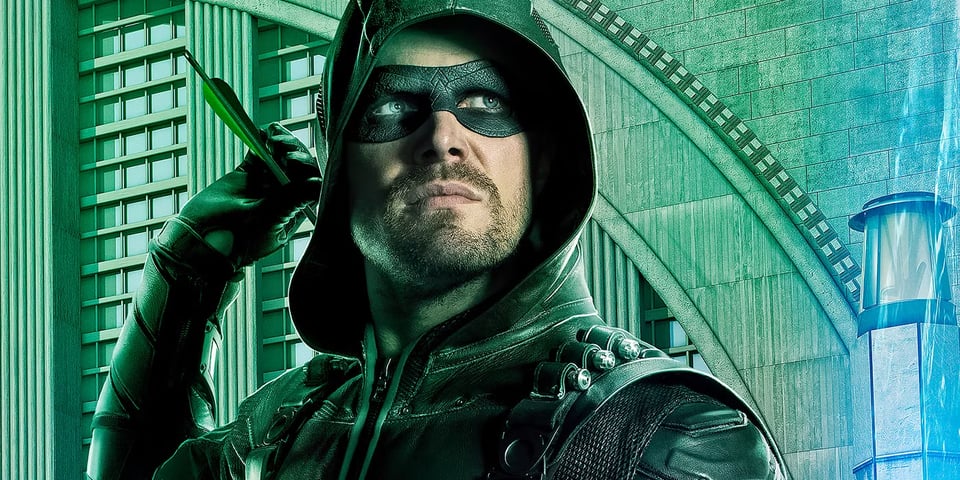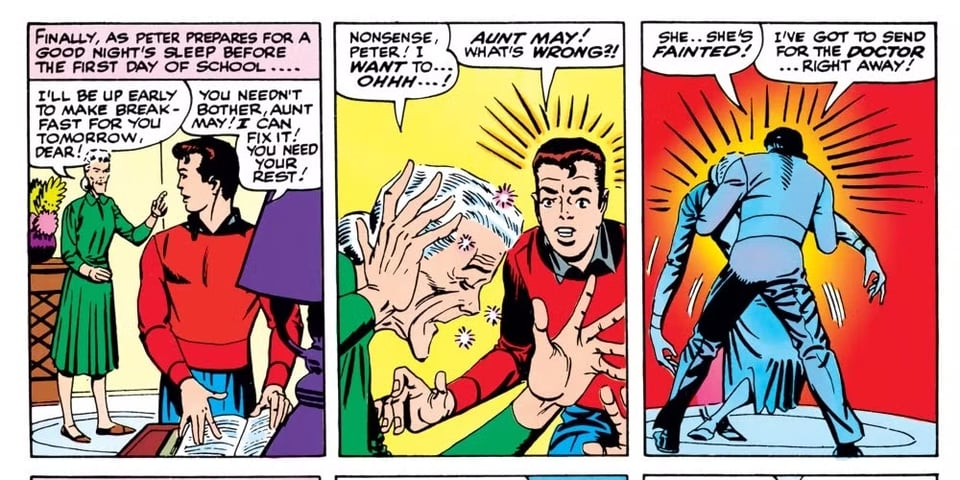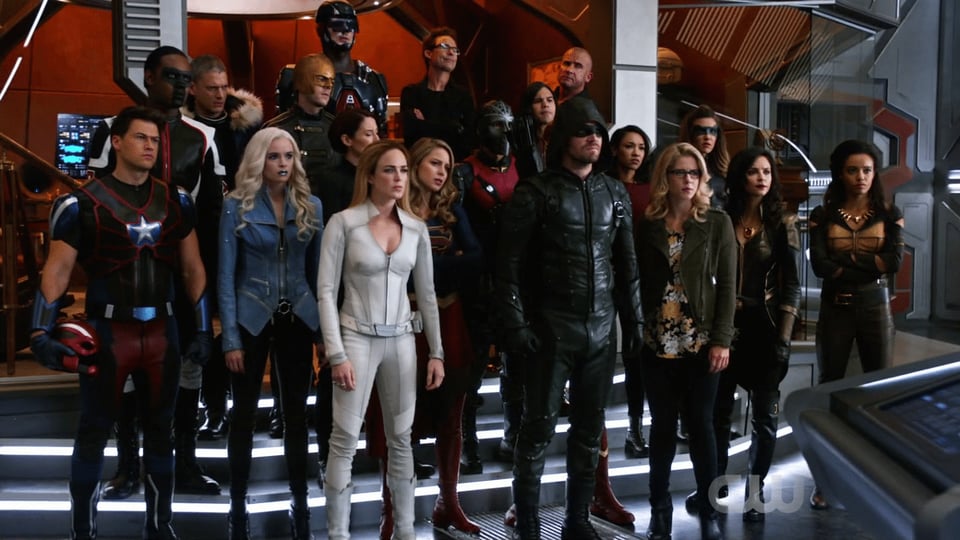Superheroes Will Never Again Be As Good as the Arrowverse
Quick housekeeping before we get started… first, I have a few bound galleys of my new novel for adults, Lessons in Magic and Disaster, which comes out August 19. It’s about a young witch who teaches her grieving mother how to do magic. I’m thinking of doing something unusual: I send this early copy to a reader of this newsletter, who promises to send it on to another person when they’re done. And when that person is done, they also send it on to someone else. Each person writes their name in the book, so eventually it comes back to me and I get to see how many people have read it. If everybody is good about reading it right away and then sending it along, I figure we can hit at least ten people by August. Does this sound fun? If you’re in the USA and want to be part of this, please email limadcopies@gmail.com and maybe I’ll put together a chain.
Also, if you’re trans/non-binary/genderqueer and nerdy and you happen to be in the Bay Area, we’re having a Trans Nerd Meet Up this Saturday from 12:30 until whenever at Zeitgeist in San Francisco!
Okay, on with the newsletter…
We’ll Never Get Live-Action Superheroes As Good as the Arrowverse Again
Tonight is the final episode of Superman and Lois, a show that was technically not part of the Arrowverse, but still spun off from the Arrowverse. (It's complicated.) Even though I complained about this show rehashing the boring old “Death of Superman” storyline, I have been blown away how good this final season has been overall. Despite steep budget cuts, the creators managed to craft an exceptionally rich final season full of beautiful moments.
A couple of moments stand out to me as especially good. First, the bit where Lex Luthor tries to bribe a woman in Smallville to sell her land by offering $10 million each to her and everyone else in the bar where they are talking. All of the good people of Smallville, gathered in the bar, realize that this is a bribe and it doesn't feel right — so they unanimously reject his potentially life-changing offer. The fact that this scene aired the day before the latest election, in which people responded somewhat differently to a big city rich guy making promises, only made it more poignant. The other moment that really stands out to me was in the penultimate episode, where Jordan Kent reveals his true superpower: he has an experience of panic attacks and can use his Kryptonian abilities to help Vicky May through one of them. It’s about two minutes into this video:
It's such a beautiful scene, and Alex Garfin brings the whole arc of his character over the course of the past four seasons to it. He has grown and stepped up and become more of a hero, but he's still that kid who struggled with panic attacks and mental health issues — and that makes him a better hero.
Anyway, Superman and Lois represents the end of the Arrowverse, even if it set itself apart. So this is a good moment to talk about why the Arrowverse was hands down the best live-action superhero content we are ever going to get.
What was the arrowverse?
Back in 2012, I remember being a bit skeptical of Arrow, a brand new show about based on the Green Arrow, one of DC Comics’ second-string characters. Oliver Queen was a Batman knockoff, except that instead of everything being bat-related, everything was arrow-related. He would shoot trick arrows with boxing gloves and various gadgets attached to them. In the comics, he used to drive an arrow-car and work out of an arrow-cave. His main personality trait was being a white man from a wealthy family who lectured everyone else about social justice.

The real reason I was skeptical of Arrow, though, was because superheroes had had a rough time on TV lately. Sure, Superman had starred in two hit shows: Lois and Clark and Smallville. And Heroes had been a massive sensation for one season, before rapidly falling from grace. But by 2012, TV superheroes were not looking so hot. More recent attempts, such as The Cape and No Ordinary Family, had fallen flat.
Heroes and Smallville had both seemed overly concerned with catering to people who didn't like superheroes, or weren't familiar with them. Smallville would never allow Clark Kent to become Superman. Heroes never put its characters into costumes, but forced us to sit through many scenes inside a comic book store where nerds could explain superhero tropes to the audience at great length.
By 2012, the Marvel Cinematic Universe was massive and DC was frantically trying to create its own version. (I really want to visit the alternate universe where the Ryan Reynolds Green Lantern movie was a hit, and Warner Bros. built an entire cinematic universe around it.) Superheroes clearly ruled the big screen, but could they make inroads on the slightly smaller screen?
Arrow, as it turned out, was incredibly good and quickly became a monster hit. They really leaned into the Batman comparisons, making Stephen Amell arguably the second or third best live-action Batman of all time. The show had a strong character arc in which Oliver Queen starts out murdering corrupt douchebags, but gradually comes to see the error of his ways. Meanwhile, he confronts worse and worse villains, some of whom try to corrupt him in various ways.
Arrow quickly gave rise to a spin-off called The Flash, which was an even bigger hit. Then came two more spin-offs: Legends of Tomorrow and Batwoman. Two shows that started off as unrelated, Supergirl and Black Lightning, eventually became incorporated into this shared universe as well. (The versions of Superman and Lois Lane featured in Superman and Lois got their start in the Arrowverse, but it was eventually clarified that their show is in a separate timeline. Also, Constantine, an unrelated show, was brought retroactively into Arrowverse continuity.) Soon there were crossovers, involving more and more complexity and grandiosity, until they finally attempted the ultimate hubris: adapting the Sistine Chapel of comics crossovers, 1985’s Crisis on Infinite Earths.
For a period of roughly a decade, The CW was serving up a feast of largely well written, well-acted superhero stories with a lot of heart and characters that you could become super invested in.
Why was the arrowverse so good?
Here is where I confess to my own priors: I believe that superhero stories are first and foremost soap operas. They came out of a serialized format — comics — and the best superhero comics usually have a ton of simmering subplots involving romance, illness, birth and death, and various people's life problems. People don’t just love Spider-Man because he spins a web, but because he’s constantly having romantic disasters, struggling to keep his job, and trying to look after his poor Aunt May.

Superhero comics get pretty personal and grounded — and they famously never really resolve anything. Every storyline goes on forever, any change is illusory. When I was a kid, you would get epic runs like Walt Simonson on Thor, Peter David on The Hulk, or Chris Claremont on The X-Men, in which creators had enough space to keep building soap-opera storylines for years. (I’m sad that such long runs are rarer these days, but that’s a rant for another day.)
Once you know that I believe superheroes are basically soap-opera characters, you probably already know what I loved most about the Arrowverse.
These shows played to The CW’s strength, which is best summed up as serialized melodrama laced with humor and warmth. Seasons could run for 22 or even 23 episodes, which meant there was space for a whole supporting cast to keep their own storylines on a low simmer. Arrowverse shows were brilliant at having short choppy scenes, in which multiple character beats would be churned through with breathtaking efficiency. There are scenes in the later seasons of Arrow where half a dozen people are standing around the Arrow-cave, and everybody’s emotional arc is advancing a little bit, sometimes just through a meaningful look or a single line of dialogue.
The other reason I really loved the Arrowverse is because it loved superheroes. Profoundly, passionately. Unlike some previous attempts at superhero adaptations, the Arrowverse wore the cheesiest aspects of superhero comics proudly on its sleeve and dared anybody to scoff. I'm not just talking about the comics-accurate costumes, which also were a part of the later seasons of Smallville. I'm talking about putting Gorilla Grodd, a giant super-intelligent telepathic ape, into The Flash early on. I'm also talking about wholeheartedly embracing tropes like secret identities — which even many superhero fans seem to find embarrassing, but which I love.
And there was tons of romance! And some goofy storylines — because of the real estate afforded by 22 episodes per season, the Arrowverse could embrace a wide range of tones. These shows were also way more inclusive than most superhero media, featuring tons of queer characters (especially in Batwoman and Legends of Tomorrow) and some truly ground-breaking storylines around lesbian and trans characters. Dreamer’s arc on Supergirl is still one of the best representations of trans women I’ve seen on TV. Plus some great Black and Brown heroes: in later seasons, Arrow’s team of heroes included John Diggle, Mr. Terrific and Wild Dog, all of whom were allowed to be complex characters. And these shows weren’t afraid to tackle tough storylines around race, xenophobia and bigotry.
And even though superhero comics love the illusion of change, I appreciate how the Arrowverse allowed its characters to change over time, learning from their past mistakes and growing as people. At a certain point, Oliver Queen and Barry Allen both married and eventually had kids. (Because of the aforementioned goofiness, both of these heroes had adult offspring who had traveled back in time from the future. Because why not?)
Most of all, the Arrowverse was nearly always extremely fun. It was fun in the way that most CW shows were fun: trashy, silly, emotionally devastating, messily unpredictable. But it was also fun in a uniquely super-heroic way: the action scenes generally felt thrilling, in a very different way than action scenes in most movies. Arrow had shockingly good fight choreography, and would actually let you see what was happening in these fights. When the shows did have to resort to CG, they usually worked quite hard to make whatever was happening extremely legible, and lean into the human aspects as much as possible — in part because the CG usually looked a bit fake. (Which I loved.) I've seldom had as much fun with superheroes in TV and movies as I had consistently with the Arrowverse.
Why we’ll never have anything like the Arrowverse again
Arrow debuted in September 2012. Slightly more than a year later, in October 2013, a show debuted that pointed the way to the Arrowverse's eventual demise: Marvel's Agents of S.H.I.E.L.D.
While the Arrowverse managed to remain separate from the various DC Comics movies, Agents of S.H.I.E.L.D. bent over backward and sideways to try to fit in with the continuity of the Marvel Cinematic Universe, to the point where its first season slow walked a huge reveal so as not to mess with Captain America: The Winter Soldier. This was not a reciprocal relationship: the movies didn’t worry overmuch about accommodating Agents of S.H.I.E.L.D. and the other TV shows that supposedly took place in the MCU. Eventually, Agents of S.H.I.E.L.D. got kicked out of the MCU altogether, along with shows like Cloak and Dagger, Runaways and all the Netflix shows. (Though there are rumbles that the Netflix shows may start sneaking back into MCU continuity again. Canon is fake.)
To be clear, I think agents of shield is one of the best superhero-adjacent TV shows of all time, and its spin-off, Agent Carter, might actually be the best Marvel TV show ever. But these shows also provided a case study in why trying to make a TV show subordinate to a film franchise is a tricky prospect at best and potentially disastrous at worst, something I have written about before.
There's also the fact that the Arrowverse was lucky enough to exist during a transitional moment in television, and culture generally.
On the one hand, VFX and other aspects of production had advanced to the point where you could do superheroics on a TV budget without looking silly. And respect for superheroes had reached a place where you no longer needed to hold people's hands as much as Heroes had. On the other hand, cable TV hadn’t died yet and the streaming revolution had not yet taken over. You could still have long seasons, and shows could last seven or eight seasons apiece. TV shows could still feel like TV shows, with act breaks and fast-paced storytelling that often took characters on hairpin turns. Not every TV show needed to have lavish production values and a carefully crafted, serialized story.
There was a shining moment when we could have really credible super heroics on television, but it could still feel like old-school television.
Now, of course, superhero acceptance has turned to the dreaded Superhero Fatigue — in part because most superhero adaptations haven’t been able to encompass quite as many tones, or take as many big swings, as the Arrowverse did. We're all waiting with bated breath to see if Captain America 4, Thunderbolts, and the new Superman movie can turn things around, after a largely disappointing run for recent superhero films (apart from Deadpool and arguably Venom.)

In any case, superhero movies are incapable of giving us the kind of soap opera that I believe is at the core of superhero storytelling. Tony Stark basically learns the same lesson over and over again in various MCU films, and I cannot actually explain Bruce Banner's arc in the MCU at all. The MCU has always seemed much more focused on maintaining continuity regarding widgets (such as the infinity gems), rather than deep character development across multiple movies. This isn't a knock on the MCU — it's just how movies generally work, especially tentpole movies. It's hard enough to create a satisfying character arc in one movie, let alone five.
I also don't feel like we're going to get that level of cheerfully unglued soap opera, involving a sprawling supporting cast all dealing with their own issues, out of superhero TV shows that A) last 10 episodes, B) service plot points from the movies, and C) then disappear for 2 or 3 years between seasons. (Season one of Peacemaker did actually accomplish miracles, and I’ve been enjoying Harley Quinn, Batman: Caped Crusader and Invincible a lot.)
But I'm not here to complain about the current superhero landscape. I'm here to praise the Arrowverse, with a tear in my eye — because we really will never see it's like again.
Someone will inevitably revive the Arrowverse one day. Probably, when the rights issues have been sorted out, we will see some nostalgia-driven TV movie or miniseries on Max, several years from now. But it won't be the same, and it'll more be more like a drink with an old friend before parting ways than the love affair we enjoyed for the better part of a decade.
The Arrowverse will, however, live forever in our hearts, where it has always belonged.
